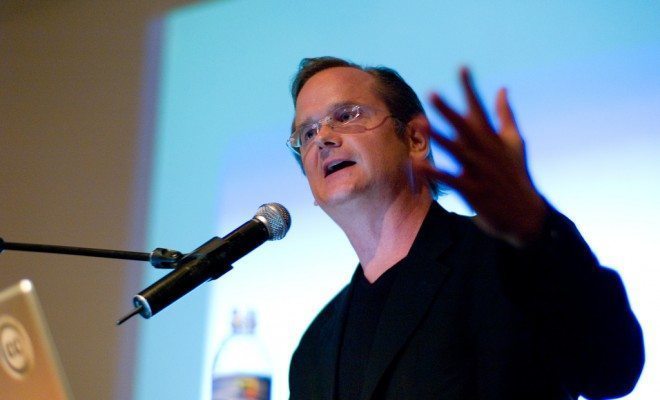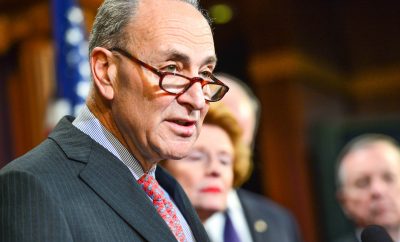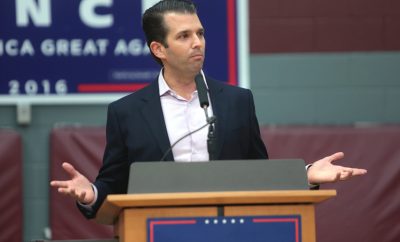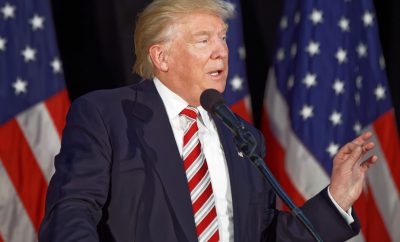 Image courtesy of [Joi Ito via Flickr]
Image courtesy of [Joi Ito via Flickr]
Elections
Lawrence Lessig: Campaigning to Not Be President
The crowded 2016 election may get yet another face, but the newest candidate might run on a uniquely one-dimensional platform. Lawrence Lessig, a Harvard Law professor and government reform advocate, launched a presidential exploratory committee this week, but unlike most candidates, Lessig’s potential campaign will focus on reforming politics by removing the influence of money. If elected, he will consider his presidency a mandate to fix the political system–and then promptly step down.
In a video released this week, Lessig announced that if the leading Democratic candidates do not make government reform the single focus of their campaigns, and if he is able to raise $1 million from small donors by Labor Day, he will declare his candidacy for the Democratic nomination. But what truly makes the possibility of Lessig’s campaign unique is his promise to hold the presidency only until meaningful reform is passed, after which he would resign–allowing the elected Vice President to assume the presidency. See the video below for Lessig’s announcement:
So what are Lessig’s ideas for government reform? His three-point plan, which he calls the Citizen Equality Act of 2017, involves “the equal right to vote,” “equal representation,” and “citizen funded elections.” This plan combines existing reform policies to, among other things, remove voting barriers, stop gerrymandering, and institute a voucher or public fund matching system for campaign donations.
The underlying problem that Lessig emphasizes is the idea that in the current American political system, every citizen does not enjoy equal representation from elected officials–or in Lessig’s words, “the system is rigged.” Much of this hinges on his issues with the current campaign finance system, in which wealthy donors are able to pour unlimited amounts of money into Super PACs and Social Welfare Organizations (for more information on campaign finance see LawStreet’s explainer here). According to Lessig, all current political issues pale in comparison to what he calls “citizen equality,” because absent this equality, Congress’ agenda will remain controlled by the small number of people who fund their campaigns.
One of the most interesting aspects of Lessig’s announcement is his idea of a “Referendum President,” who would hold office only as long as it takes to enact reform, then promptly resign–allowing the elected Vice President to assume office. If Lessig does run, he intends to make his campaign about his reform package rather than his capacity to carry out the duties of the Presidency. In his announcement video, Lessig said, “The candidate is the referendum. The campaign is for that referendum.”
This isn’t the first time Lessig has attempted to use novel methods to reform politics. In 2014, he created the Mayday PAC, which spent close to $7.5 million to support Congressional candidates who favor campaign finance reform. While the PAC was not particularly successful–only two of the eight candidates that it supported won their elections in 2014–the idea of using a “Super PAC to end all Super PACs” was certainly unique. This time, however, Lessig seeks to gain a much broader base of support, rather than soliciting support from “50 billionaires.”
Lessig’s campaign may seem like a long shot, and it likely is, but there is a good chance that he will at least launch a campaign. There are two conditions that must be met in order for him to declare his candidacy after Labor Day. First, he must raise $1 million in the next 26 days–he has currently raised nearly $150,000 so far this week. Second, he will only run if no leading Democratic candidate promises to make his reform agenda the primary purpose of their campaign. While several of the candidates have called for campaign finance reform, and some even want a constitutional amendment along those lines, Lessig says that they must do more to make their goals credible.
Another remaining challenge for Lessig is the upcoming Democratic debate. If he does run, he will almost certainly need to participate in the debate in order to have a reasonable shot at the Democratic Nomination. Per the Democratic Party’s rules, candidates must poll at over one percent in at least three national polls to qualify, a threshold that Lessig believes he will be able to reach. In an interview with the Washington Post, Lessig said, “If we can be in the debates and frame this issue in a way that becomes compelling, then I think there’s a chance to see it take off.”
While his campaign might be a long shot, if you think campaign finance and political reform are important you may want to keep an eye out for Lessig’s campaign. He may fail to get enough support for a successful campaign, but his efforts could elevate the issue of campaign finance as the 2016 race heats up.








Comments